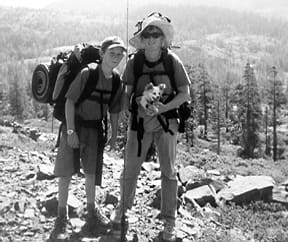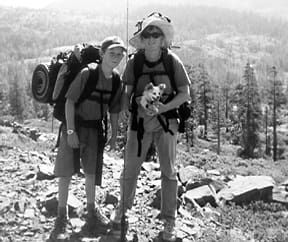[Updated December 26, 2018]
Camping means different things to different people, but to dogs, camping means fun!
Like most things with the word “camp” in them, dog camps generally take place in the country and involve sleeping away from home. The camps come in two main types: intensive training-oriented seminars and “fun camps,” where dog-oriented socializing and entertainment are the order of the day.

Camp Gone to the Dogs, the oldest and most famous “fun camp,” has offered week-long vacations for people and their dogs at Vermont school campuses and country inns since 1990. “When we feature sports like agility and obedience,” says camp founder and director Honey Loring, “the emphasis is never on competition. Our goal is to have fun.”
In training-oriented camps, the focus is on in-depth education in canine sports and occupations, including competition obedience, Schutzhund, agility, flyball, tracking, field training (hunting), search and rescue, water sports, sheep herding, mushing, backpacking, clicker training, disc dog (Frisbee), and more.
Whether your concept of a vacation with your dog is relaxing or intense, and your idea of “camping” is electricity-free or just free of cable TV, there is a camp for you.
Picking the Right Camp for Your Dog
In fact, the selection is so bewildering that we consulted veteran camp enthusiast Dana Crevling for guidance. Crevling has attended and worked at more dog camps than she can remember, starting with Jack and Wendy Volhard’s Instructor School/Training Camp in the mid-1980s. Her own Competitive Edge Sports Camp is now in its fourth year.
Finding the right camp for you and your dog, says Crevling, involves many considerations. For example, would you and your dog be more comfortable in a large, active camp, or a quiet, more intimate program?
“Large camps offer things that small camps can’t,” Crevling says, “like a wide variety of staffing and activities, while small camps provide a more personal atmosphere and individual attention. People who haven’t thought this through often choose camps that aren’t good matches for their personality or learning style. Camps can be overwhelming. How do you and your dog cope with stress, distractions, busy schedules, crowds, and other dogs? Will the camp’s activity level be comfortable for both of you?”
Next, consider your interests and experience. Do you and your dog enjoy obedience? Agility? Flyball? Would you like to try herding? Lure coursing? Tracking? Are you interested in canine behavior, clicker training, or training in general? Do you want to take a qualifying test for a sport or activity?
“If all you want is an informal introduction to something you haven’t tried,” says Crevling, “most camps that offer it will be fine. But if you’re already working at an intermediate or advanced level, or if you want specialized training or individual attention, you’ll want to be more selective.”
In order to do this, be clear about your goals. Do you want to relax and play with your dog? Shave two seconds off your agility time? Earn a credential? Work with a specific trainer?
“Defining your goals,” says Crevling, “helps prevent the nightmare of finding yourself at the wrong camp, in a class that’s too elementary or too advanced, in sessions taught by someone other than the person you wanted to work with, or in classes that are too large or too small for comfort.”
Once you’ve zeroed in on the type of camp you want to attend, you have to consider the possible locations. Many of us won’t fly our dogs, which makes distance a deciding factor. However you get there, consider the effect that the trip will have on you and your dog. For best results, plan your travel so as to arrive with enough time to begin camp feeling relaxed, not frazzled.
Considerations for Choosing a Dog Camp
Once you know what you want, it’s time to research camp programs. “To make a good investment of time, money, and energy, start with basic research,” says Crevling. Many camps have websites that describe activities, staff, and accommodations. Contact the camps’ directors for more information, including referrals to campers who attended the previous year.”
As you research, ask the following:
How large is the camp? Some camps accommodate more than 250 participants and auditors (observers). That’s big! And some are so small, they limit attendance to 6 or 10. What size best suits you and your dog?
How is the camp organized? What is the camp’s layout? Are classes indoors or outdoors? Nothing beats fresh air and beautiful scenery, but what if it rains all week?
Is the camp a day camp or sleep-over camp? Day camps provide classes, lunch, and in some cases evening events, but campers are otherwise on their own. Sleep-over camps offer a total package with more camaraderie but less privacy.
Accommodations range from tents to dorm rooms, cabins, motels, and RV hookups. “If you’re a real comfort person,” warns Crevling, “you won’t enjoy a camp where you need a flashlight to find the bathroom.” Day camps provide a list of nearby dog-friendly motels and bed and breakfast inns, and many sleep-over camps do the same for those who prefer a more comfortable or more private room.
How are classes structured? “In a tightly structured camp,” says Crevling, “you know what time each class starts and ends and who’s teaching it. In a loosely structured camp, you’re given general topics for the day, and people rotate through stations, working on each concept or project until they complete it. To someone who likes a specific schedule, the relaxed approach seems unfocused and vague, and to someone who likes the relaxed approach, a fixed schedule is too rigid and arbitrary. Check previous schedules, contact the director, and talk to campers who have been there to be sure a camp’s classes will be a good fit for you and your dog.”
How large are the classes? Class size will help you compare prices, especially in sports where one person works with the instructor and everyone else waits. The importance of class size depends on your sport, how the camp is organized, and how much individual attention you want.
What is the camp’s philosophy? At one camp the focus might be on deepening your relationship with your dog, with instructors who are skilled people trainers as well as dog trainers. At another the focus might be on performance, with instructors taking a more businesslike approach. Training methods differ, too.
CAMPS FOR DOGS
Contact camps for session information and dates. Abbreviations for various training offerings are listed below.
| A = Agility |
| B = Backpacking |
| C = Carting |
| CT = Clicker Training |
| D = Disc (Frisbee) |
| F = Flyball |
| H = Herding |
| L = Lure Coursing |
| M = Musical Freestyle |
| O = Obedience |
| R = Rally Obedience |
| S = Search & Rescue |
| T = Tracking |
| TT = Tellington TTouch |
| W = Water Sports |
| + = More |
| ++ = Much More |
Sleepover Camps for Dogs
The Getaway at Glen Highland Farm (A, CT, H, O, TT, ++)
Highland Vue, Morris, NY. (607) 263-5415
Camp Dogwood (A, B, C, D, F, H, L, O, R, T, ++, Fun camp)
Chicago, IL. (312) 458-9549
Camp Gone to the Dogs (A, CT, F, H, L, M, O, R, T, ++, Fun camp)
Putney, VT 05346. (802) 387-4673
Dogs Of Course (A, +)
Upton, MA. (508) 529-3568
Dog Scout Camp (A, B, CT, F, O, W, +)
Dog Scouts of America, St. Helen, MI. (989) 389- 2000
4-H “Fun with Your Dog” Camp (+)
Dana Palmer, 4-H Youth Programs, Cornell University, Ithaca, NY 14853
Old Dominion K9 Search and Rescue Camp (S)
olddominionsar@hotmail.com, Appomattox, VA
Sheep Camp (H, CT)
Raspberry Ridge Sheep Farm, Bangor, PA. (610) 588-5262
Day Camps for Dogs
Agility Camp (A)
Orlando Dog Training Club, K. Clark. (407) 856- 4114
Agility Camp (A)
Shake-a-Paw Dog Training, (613) 258-1366
Paws-Abilities, Tukwila, WA, (425) 277-3794
Clicker Agility Camp (A, CT, +)
Say Yes Dog Training, (610) 222-3645
Pawsitive Steps Agility Camp (A)
Kim Collins, (250) 964-1250
Livermore, CA. (925) 294-8965
Volhard Training Camp & Instructor School (A, O, +)
Top Dog, FAX (540) 829-8153
Insider Tips from Veteran Campers
■ Policies vary from camp to camp, but sports and fun camps depend on campers to bring well-socialized dogs. Anyone with an extremely shy, fearful, or occasionally aggressive dog should consult with camp directors before registering. Dogs should not bark excessively.
■ Some camps require certain titles, training, or experience as prerequisites. Read contracts and waivers carefully before signing.
■ Bring appropriate equipment and food for your dog. Campers are expected to clean up after their dogs immediately and thoroughly. In most camps, dogs must be leashed unless specifically allowed off-leash. Dogs left in rooms must be crated and stay quiet. In most camps, state health regulations do not permit dogs in dining rooms, and some states prohibit smoking in all rooms.
■ In most cases, campers must be 18 or over, although some camps allow children age 13 to 17 if accompanied by an adult, and 4-H dog camps are specifically for children.
■ Most camps allow campers to bring two dogs, with an additional fee for the second dog. Some camps have special classes and play groups for puppies.
■ Females should not be in season. Vaccination requirements vary, but most camps require proof of rabies vaccination.
■ The more rustic or specialized the camp, the more campers are expected to be physically active.
■ Things you may want to bring: flashlight, alarm clock, lawn chair, camera, fan, tape recorder, sheet for placing under kennel, and cell phone (but keep it turned off during classes). Required at some camps: sleeping bag or sheets and blanket, pillow, and towels (for you and your dog!).
Other Considerations
“To compare camps fairly,” says Crevling, “you have to put them on an even playing field. How long does the camp last? Does the fee include your room and meals? Is there anything special about the food? Are classes limited in size, or is there open enrollment? Who are the instructors? What extras are included? What are your travel expenses? Will you need special equipment? Consider all the variables as you determine which camp offers the best value.”
ENROLL YOUR DOG IN CAMP: OVERVIEW
1. Make camp reservations as early as possible. Many summer camps are booked by the end of January, and most offer discounts for early enrollment.
2. If you and your dog are new to camping, look for a laidback program for your first experience. Camp can be overwhelming!






